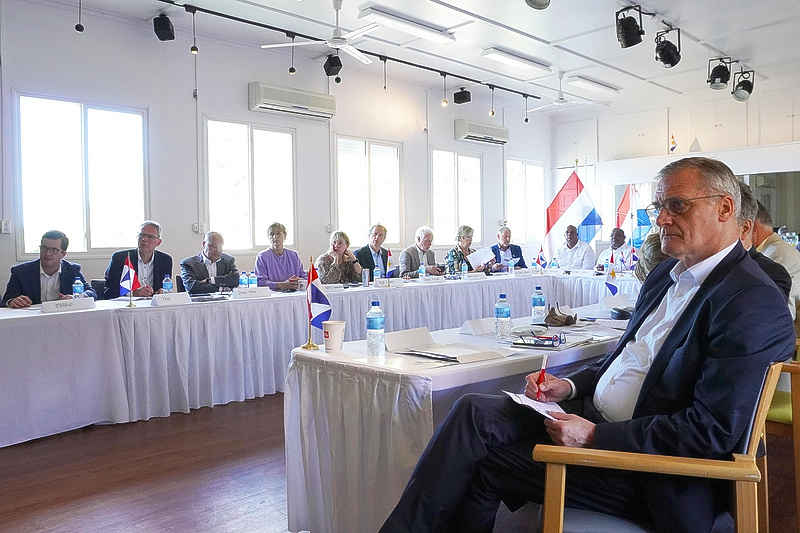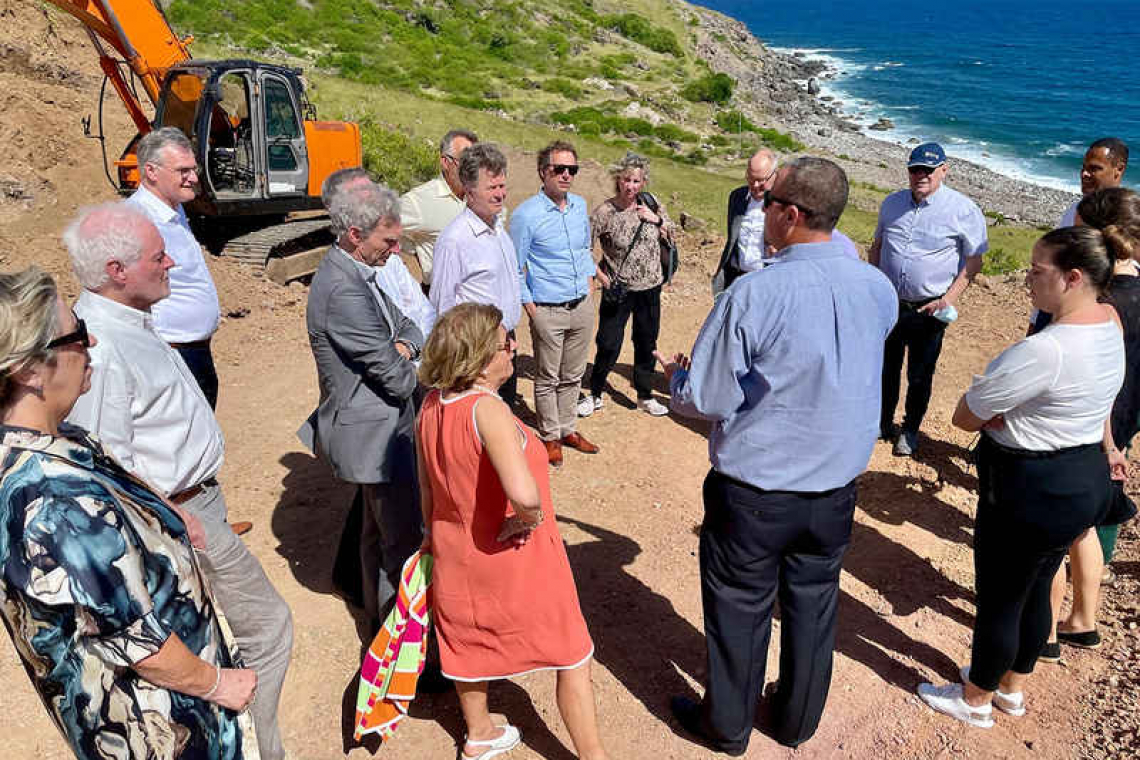The First Chamber delegation received an update about the new harbour project at Black Rocks.
SABA--Four main topics for Saba were elaborated on and discussed during a session with the Executive Council, Island Council and the delegation of the First Chamber of the Dutch Parliament, the Senate, on Monday, February 28.
The senators listened attentively to the presentations about livelihood, renewable energy, economy/tourism/nature/agriculture and finances. The delegates posed many questions that were answered by members of the Executive and Island Councils.

The visiting Senators and Members of the Executive and Island Councils in session at Eugenius Johnson Center.
The session at Eugenius Johnson Center in Windwardside was opened by Island Secretary Tim Muller. He said it was important for Saba to use the momentum of the visit of the 13 Members of the Senate’s Permanent Committee for Kingdom Relations in fostering the relations with the Netherlands, to exchange information and to “put a dot on the horizon.”
Island Governor Jonathan Johnson elaborated on how Saba coped during the COVID-19 pandemic with a hard-hit local economy, an initial hard lockdown, a highly successful vaccination programme, stringent measures at the border and financial support from the Dutch government.
Poverty
Gideon Wilson of the Community Development Department gave a presentation about poverty in Saba, its challenges and ramifications. Many people are living under or near the poverty threshold. People living in poverty tend to end up deeper in the cycle.
“Most clients when they can’t pay their rent, they take an advance on their salary or go to a loan shark, and they get into even deeper problems. People are stigmatised. The social workers listen and assist the clients so they can get out of the cycle,” he explained.
Councilman Vito Charles said that people were living in great stress with several jobs trying to survive, a situation that also affected children in these families. With the very high cost of living in Saba, people are having difficulties making ends meet, Charles said.
Councilman Eviton Heyliger said that many persons living in social housing had trouble paying the rent at the end of the month, ended up being behind on payments and often were too proud to say this.
Commissioner Rolando Wilson said the regulations at the National Social Affairs and Employment SZW unit were too bureaucratic and insufficiently effective. “As local government, we feel the duty to help people struggling with poverty, so we created our own Community Development Department,” said Wilson.
Councilman Carl Buncamper said the focus at the SZW unit was too much on the process instead of on the impact of poverty that people were facing. “There needs to be more flexibility so people can get the support they need,” he said.
“We hired our own social workers because we saw that the SZW unit was not doing enough. Structures were put in place without our involvement. A one-size-fits-all was implemented that doesn’t benefit the people that need help. Establishing the social minimum is key and this has still not happened. It is a long-time discussion and we need a dot on the horizon so people can live a dignified life,” said Commissioner Bruce Zagers.
Asked by the delegation how Saba wanted to achieve that, Zagers responded that a higher minimum wage, a higher pension, a realistic social benefit “onderstand”, affordable electricity, telecom and water were needed, as well as the establishment of the social minimum.
SEC presentation
Mark Zagers, Dexter Johnson and David Leonce of Saba Electric Company (SEC) gave a presentation about the Saba Energy Strategy, the plans to add one to three megawatts (MW) in additional renewable energy, combined with additional energy storage, grid intelligence and modernisation, energy efficiency and a conservation programme, and electric vehicles.
At the same time, SEC faces challenges such as high fuel prices, the lack of capital for investments and a small consumer base while trying to keep the electricity tariffs as low as possible. The fixed rates have been subsidised for three years due to the crises, but it is not structural and slated to end in July.
Policy advisor Courtney Hassell gave an introduction to Saba’s economic development, where the island wants to go, the economic challenges it is facing and how to move forward. She announced the start of the economic impact assessment. Poor banking services, high costs, the too stringent conditions to get a mortgage, the absence of a postal code and the lengthy immigration process for working permits all have an adverse on doing business in Saba, she said.
Tourism Master Plan
Director of Tourism Malinda Hassell gave a presentation in which she mentioned the presentation of the Tourism Master Plan this summer, the challenges of the tourism industry, the slow recovery during the pandemic, Saba as a green destination and the dependency on the hub St. Maarten.
She mentioned the importance of connectivity and the need of having sufficient airlift. She said there were currently only 124 hotel rooms, not enough for the demand. The opening of the new Arawak Hotel later this year and the renovation of now-closed Scout’s Place in the future should alleviate the shortage of capacity.
Policy advisor Justin Simmons-De Jong gave a presentation on the efforts to invest in agriculture and nature. The local production of fresh produce increases food security at lower prices and promotes people’s health. To preserve nature, the restoration of the coral reef is taking place and erosion is being tackled by, among other things, promoting responsible animal husbandry, the removal of wild goats and reforestation.
Financial challenges
Finance Department head Maureen Hassell spoke about Saba’s sound financial management and the financial challenges. The free allowance is too low to cover the operational cost of a government that has seen an increase in tasks and responsibilities. The large portion of incidental funding as opposed to structural funding makes it hard to manage and to plan ahead, and creates a lot of risk.
“There is a great uncertainty of funding. We go from year to year, not knowing whether we get the funding. Our very core of government is funded through incidental funding,” said Hassell. The lack of structural funding makes it impossible to present a realistic budget and there is no financial space to implement new policy.
Zagers pointed out that the free allowance increased less than US $1 million in six years: in 2016 it was $8.9 million and in 2022 $9.8 million. He said Saba needed a substantial increase in the free allowance.
“We have been a responsible partner. Raising the free allowance sends a message that if you achieve things, you get things,” Zagers said, referring to Saba’s steady accomplishments in sound financial management over the years.
Warm welcome
Leader of the Senate’s delegation Paul Rosenmöller said the entire committee was very passionate about contributing to solid relations in the kingdom. He said that while these relations have a long history, there were always challenges and room for improvement.
“We want to talk about how we as Senate can contribute to solve those challenges, to make things better for the islands and to improve the relations in the kingdom. We want to listen and to learn from you.”
Rosenmöller thanked Saba for a warm welcome. “We are always impressed by your hospitality,” he said. For some members it was their first visit to Saba, while some had already been here a few times and others many times. He said a 1.5-day visit of the delegation was obviously too short and that the committee would certainly be back.
After a visit to the location of the new harbour at Black Rocks where they received an update about the project from Zagers, policy advisor Zelda Meeuwsen and trainee Hester van Halen, the Senate’s delegation interacted with members of the community in a meet-and-greet. The delegation left for St. Eustatius in the late afternoon.







